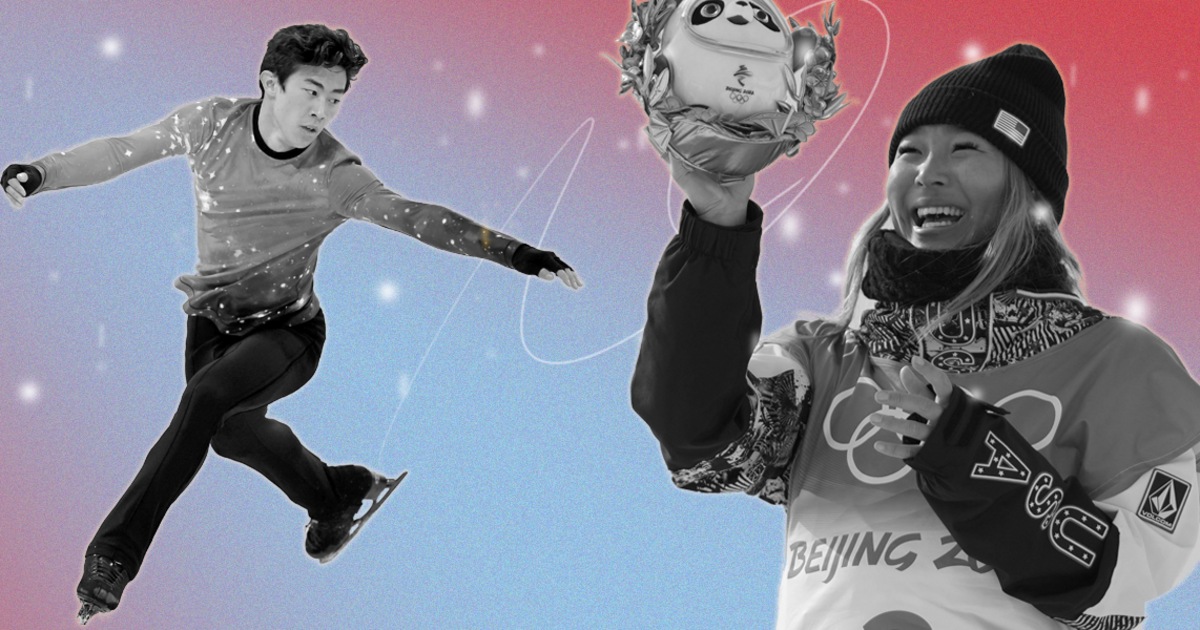
Four years after she won gold in PyeongChang, South Korea, snowboarder Chloe Kim defended her Olympic crown in the women’s halfpipe in Beijing last week. A few hours later, Nathan Chen became the first Asian American to win gold in men’s figure skating, solidifying his status as the most dominant skater of the last four years.
The landmark victories of the two young phenoms — who have become the literal faces of the U.S. Olympic contingent — have given many Asian Americans a sense of pride at seeing someone who looks like them on top of the podium. But even with the historic wins, experts say, many of the narratives surrounding Asian American athletes at the Olympics have played into tropes of good immigrants and bad immigrants.
‘Good immigrant values’
Rachael Miyung Joo, an associate professor of American studies at Middlebury College in Vermont and the author of “Transnational Sport: Gender, Media, and Global Korea,” said Asian American athletes have long faced pressure to pledge their allegiance to the U.S., which can be traced back to the early 20th century, before the internment of Japanese Americans during World War II.
“Within this historical context, Nathan Chen and Chloe Kim have been praised as unquestionably American,” Joo said.
Kim’s and Chen’s narratives align with what Joo described as “good immigrant values.” At the last two Winter Olympics, they have openly talked about the sacrifices their hard-working and self-reliant parents have made in pursuit of their Olympic dreams — Kim’s father, Jong Jin, gave up his job to help her realize her potential; Chen credited his mother, Hetty Wang, with driving him thousands of miles in their “trusty little Prius” to support his career.
“They are certainly right to point to their support networks that brought them here,” Joo said. “These expressions of gratitude are an expectation for immigrants and for the American public — a demonstration that the U.S. continues to be the country with the most opportunity and the most freedom.”
Questioning loyalty
As political tensions between the U.S. and China rise, Joo said, the question of loyalty goes the other way, as well. Freestyle skier Eileen Gu, who won gold in big air freestyle skiing and silver in the slopestyle event at the Olympics, and figure skater Zhu Yi are Chinese American athletes who elected to represent the host nation, China, even though they were born in California; their decisions have been used to question the loyalty of Asian Americans.
Although Gu has consistently refused to choose one country over the other, her triumph, in particular, has put her decision to represent China — her mother’s homeland — under the microscope, with some calling her a “jerk” and a “traitor” and others arguing that she is not the first U.S.-born athlete to compete under another flag.
The dichotomy is ever-present in China, as well. Gu has been lauded for her fluency in Mandarin and hailed as a national hero, but Zhu, who fell during her first two Olympic performances, has received a torrent of abuse on the Chinese social media platform Weibo, where some users accuse her of bringing “shame” to her adopted country. (After his victory Friday, Chen was labeled a “traitor” for “insulting China” and representing the U.S. in international competition.)
The three athletes’ different treatment shows how Chinese Americans are consistently subject to heightened scrutiny, forcing them to straddle the widening geopolitical divide on both sides.
Christina Chin, an associate professor of sociology at California State University, Fullerton, and a co-editor of “Asian American Sporting Cultures,” noted that, like many other Olympic athletes of color, Asian American athletes will never be solely defined by the sports they play nor by the countries they represent. They will, instead, “always be seen through a racial lens, which can add additional pressures for these athletes to represent their racial or ethnic community on an international scale.”
Gu and Yi “have had to navigate a difficult balancing act to represent both their Chinese and American identities to appease their fan base in both countries,” Chin said. “Meanwhile, white American players who compete for China’s hockey teams have not received the same level of criticism or backlash from the public. Gu and Yi’s challenges demonstrate how easily the lines of nationality, race and ethnicity are inextricably intertwined in the Olympics.”
Breaking barriers nonetheless
Still, Chen’s and Kim’s international success has the potential to combat age-old stereotypes and further a legacy of inclusion, given the historical gatekeeping and exclusion of athletes of Asian descent, experts said.
“Because Asian Americans are often underrepresented in other major sports leagues, the Olympics offers a brief opportunity where Asian American athletes can challenge people’s assumptions and racialized stereotypes about Asian bodies’ being too fragile, weak or unathletic,” Chin said. “Their commanding performances on the ice and on the halfpipe push people to reconsider those racist assumptions, making it possible to reshape how Asian Americans are seen not just in sports but in society overall.”
Winter sports have long suffered from a lack of diversity, Chin said, but Asian Americans have been able to carve out spaces for their active participation and even success, especially in figure skating, a sport that was predominantly white until the 1990s.
In 1985, Tiffany Chin became the first Asian American to win the national title — the first such victory by a nonwhite skater at the senior level. Seven years later, Kristi Yamaguchi, a two-time world champion, became the first Asian American woman to win an Olympic gold medal in figure skating. In the late 1990s and the early 2000s, Michelle Kwan won two Olympic medals to go with her five world titles and nine national titles. Their success has paved the way for future generations, who feel galvanized to embrace their Asian heritage on and off the ice.
It is also the relatability of these athletes, many of whom identify as second-generation Americans, that makes them so compelling, Joo said. “They are open about their struggles and their difficulties, and they openly appreciate their families and their support networks. They are also open about their expressions of love for the country, and there is a complete authenticity about it. … That visibility means a lot for Asian Americans.”
But while these exceptional athletes might find themselves at the top of their sports, they are not immune to “the racism and vitriol of the broader community,” said Russell Jeung, a professor of Asian American studies at San Francisco State University.
Asian American athletes face even deeper challenges of representing Asian America when their communities are seen as perpetual foreigners, Jeung said. In half of the incidents reported to his nonprofit organization, Stop AAPI Hate, Asian Americans have faced xenophobic comments, so Asian American athletes “face the double bind of not belonging and then having to prove their belonging to America.”
Victoria Chun, the director of athletics at Yale University, where Nathan Chen is completing his undergraduate degree in statistics and data science, said: “I think that Asian Americans will always feel pressure of representing their culture. That pressure starts early in life and it is something you carry with you … but there is also inspiration and pride for yourself and for your culture, nationality and sport.”
Source: | This article originally belongs to Nbcnews.com










